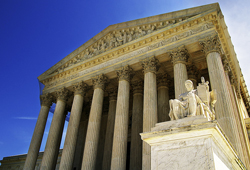 On December 13, 2016, the Ninth Circuit heard oral argument in Robins v. Spokeo (No. 11-56843) on remand from the Supreme Court. We wrote extensively (here, here, and here) about Spokeo before and after the Supreme Court’s May 16, 2016 decision. As readers may recall, the Central District of California had dismissed the case for lack of standing, but the Ninth Circuit reversed, finding the plaintiff had sufficiently alleged harm in the form of an alleged violation of the Fair Credit Reporting Act (FCRA). The Supreme Court vacated that decision and remanded the case because it found the Ninth Circuit’s injury-in-fact analysis was incomplete. As we noted after its decision was issued, the Supreme Court left some uncertainty about when (if ever) a pure statutory violation could be sufficient to establish a concrete injury-in-fact.
On December 13, 2016, the Ninth Circuit heard oral argument in Robins v. Spokeo (No. 11-56843) on remand from the Supreme Court. We wrote extensively (here, here, and here) about Spokeo before and after the Supreme Court’s May 16, 2016 decision. As readers may recall, the Central District of California had dismissed the case for lack of standing, but the Ninth Circuit reversed, finding the plaintiff had sufficiently alleged harm in the form of an alleged violation of the Fair Credit Reporting Act (FCRA). The Supreme Court vacated that decision and remanded the case because it found the Ninth Circuit’s injury-in-fact analysis was incomplete. As we noted after its decision was issued, the Supreme Court left some uncertainty about when (if ever) a pure statutory violation could be sufficient to establish a concrete injury-in-fact.
Not surprisingly, the parties’ arguments on remand in the Ninth Circuit focused on that uncertainty. (Those interested in watching a recording of the oral argument may do so here.) Robins argued that the Supreme Court’s decision does not require him to allege that he has been tangibly harmed by an alleged statutory violation, but only that Spokeo has invaded some legally protected interest created by the statute. He asserted that a two-part test requires courts to determine whether the interest Congress sought to protect is concrete, then to determine whether the alleged violation is merely procedural—that is, whether the violation is distinct from that protected interest.
Spokeo, by contrast, argued that the focus of the standing inquiry is the plaintiff, not the statute. It asserted that not every statutory violation automatically grants standing to sue. Rather, a plaintiff only has standing when he or she suffers some harm, or faces a substantial risk of harm, as the result of the defendant’s alleged statutory violation.
The parties’ focus on this dissonance may lead to a Ninth Circuit opinion that squarely addresses the gray area left by the Supreme Court, which, in turn, could lead to another petition for certiorari by whichever party loses. However, because the Ninth Circuit’s review is de novo, there is also a chance that it will find some other reason to conclude that Robins has standing. During oral argument, Judge Graber suggested the court could conclude that Robins has alleged actual reputational harm and avoid the question of whether Robins has standing based solely on his allegation of a statutory violation. In any event, observers will want to watch the result closely.

